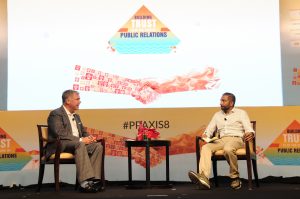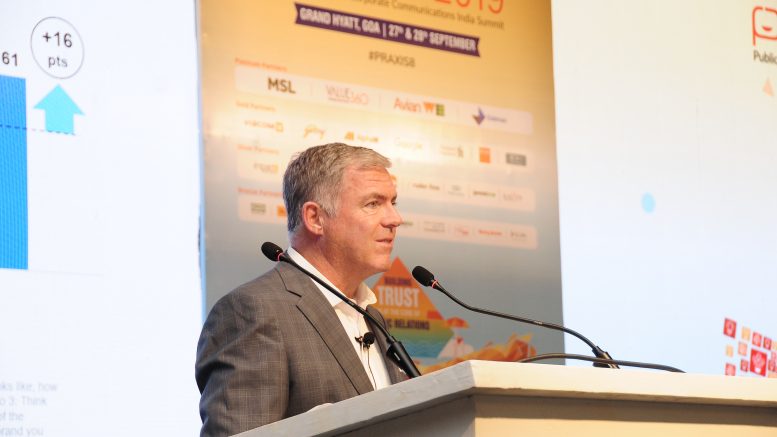Brand trust is most important today. It’s a fact now, that consumers have more options than ever when it comes to choosing one particular brand, from a complex brand- mix. In such a fiercely competitive environment, “brand trust” has emerged as a critical competitive differentiator.
Referring to the Edelman Trust study, an activity that Edelman has been doing for the last 20 years, Matthew Harrington – COO, Edelman opened his keynote address – In Brands, We Trust, saying that trust in brands is very essential and consumers can trust brands to deliver. And today, brands are expected to provide that customer experience. But the key question here is: do customers trust brands to do the right thing?
There are many reasons why brands need to trust more, he pointed out. Brands are also making bigger promises. For example you have Uber, Airbnb, Walmart. This is critical for customers. Brand trust is essential for customers to buy; in fact ‘trust ranks as a top buying consideration, in the study.
Brand trust is seen as essential across markets, ages and incomes. A vital insight that came up was that it is seen that only one out of three consumers trust most of the brands they buy. But, one thing happens when brands build trust, consumers reward them. Yes, it is a fact, that when brands earn full trust, the rewards multiply.
The big outcome that opens up, is the sheer ‘opportunity’. So, a brand can make a difference!
Consumers today have higher expectations from brands. Customers expect unique experiences with brands, almost at every interaction. Whether it is a cup of coffee or a luxury vehicle, the experience must be seamless and personalised or they will find another brand to meet their expectations. As far as Indian consumers go, he said they are not convinced of a “brand’s commitment to society.” According to the study, only 34% believe companies keep the best interest of society in mind. What is visible today, is the “declining faith in brands”. Consumers are less sure they can trust brands to do the right thing.
All trust and no action seem to be just “trust washing”, he pointed out. Brands are trying to step up – like McDonald’s which inverted the ‘M’ to commemorate Women’s Day and on the other hand, Audi’s campaign on equal pay (even though it was revealed that were only two women in their senior executive team!)
How can brands earn trust? Most consumers avoid advertising even though it is seen that trusted brands act on their words like Lifebuoy, Dove’s Mencare. One of Google India’s biggest successes has been its Internet Saathi programme, which was toeing the line of their mission in India – that is ‘Internet for everyone’; the brand has earned trust and the initiative has been successful. Another way brands can achieve this, is to use trusted influencers to break through the clutter. So that a brand can “lead with peer, amplify with owned, social and paid media” he said.

Matthew Harrington in conversation with Arun Sudhaman, The Holmes Report
In conversation with Arun Sudhaman, CEO & Editor-in-Chief, Holmes Report, who expressed the fact that there seems to be a “breakdown of trust” and that there seems to be no real action on issues. Why do brands get it wrong, he wondered. Matthew clearly stated that “We have a responsibility and must help getting engaged in things that matter. The industry should be a devil’s advocate.” And, if you are thinking in internal communication, how significant the employee has become, Matthew remarked – “It’s clever to say that employee activism is the driver!”
Taking a reality check, it is clear that the employee-employer equation is changing. When it comes to customer expectations, it is no surprise that with the latest technology, pushing us towards instant gratification, millennials have higher expectations for customer experience. So, today the milliennial workforce has high expectations, and demands transparency and more engagement between management and employees. It may come at a cost, suggested Arun to which Matthew suggested – “The promise of a win-win situation is challenging. You want to be on the right side of history, in the long haul.” He said CEOs have to lead in this, even though globally there was low recognition of this fact. Whether there was a rising cynicism about trust-washing, he was quick to point out that he does see brands “sidestepping”.
As consumers, we have our cameras handy, and all we want are perfect clicks or moments. The more we consumers ask for better experiences, the better brands will have to deliver for they need consumer trust. And, as brands bend over to try to meet our needs, we can say with conviction, that more innovative products will be unleashed – to create an impact on the trust barometer.






Be the first to comment on "In Brands, We Trust"